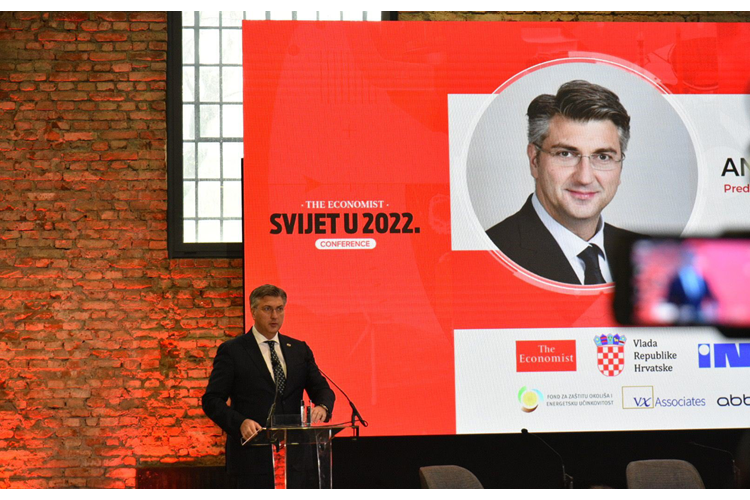


Addressing a launch conference for the Croatian-language special annual edition of the global magazine The Economist, Plenković said that Croatia has about €25 billion at its disposal for this decade, including regular funds from the seven-year European budget, funds from the NextGenerationEU, and about one billion euro for reconstruction following last year's devastating earthquakes.
"That is more than we have ever had....and these are mostly grants," he underscored.
This year's conference dealt with the transformation of the Croatian economy through the National Recovery and Resilience Plan (NPOO) 2021-2026 as the basis for the absorption of funds from the NextGenerationEU mechanism,under which Croatia has access to €6.3 billion in grants and another €3.6 billion in favourable loans.
The NPOO has been approved by the European Commission and Council, Croatia has already received an advance payment of HRK 6.14 billion, and in the first half of 2022 it will receive a new tranche, Plenković said, adding that there are some EU countries that have not yet even delivered their national plans.
The NPOO is the reform basis and financing basis for economic growth, and is forecast to increase Croatia's GDP in 2022 and 2023 by 1.4 percentage points.
Economy proved to be exceptionally tough
Plenković said that the national economy showed exceptional strength, agility and resilience, particularly since the tourism season was beyond all expectations. He also mentioned growth in personal consumption and economic growth which is expected to exceed nine percent, which is more than the eight percent drop in GDP last year.
The most important thing is that Croatia has maintained its image among international organisations, financial institutions, markets and credit rating agencies, he noted.
"Anyone who is following us sees our credibility and the direction of our actions," said Plenković and highlighted that the direction is based on a speedy return on the path to decreasing public debt and a balanced budget, which cannot be expected this year or next.
He recalled that the Fitch agency has upgraded Croatia's credit rating to its highest level since rating agencies have appraised Croatia.
"This is the framework with which Croatia is entering 2022, which should be very significant institutionally because we expect a final decision on accession to the Schengen and euro areas," said Plenković.
He emphasised the importance of political stability, noting that the period from 2021 to 2028 will have just one intensive period of about 12 months of electioneering.
Government faced with unbelievable challenges last year
Speaking of last year, Plenković said that all governments faced an unbelievable challenge as a consequence of coronavirus and had to find solutions to enable normal functioning and economic trends.
That led to a decline in all trends and weaker economic activities, but the government managed to overcome that and it does not regret the expenditure due to the coronavirus crisis which has exceeded HRK 40 billion.
"We have no regrets because we did not see any mass layoffs or bankruptcies," the PM underscored, recalling government support for wages in the private sector among other measures.
Challenges of climate change and demographic revitalisation
Globally, the pandemic is still continuing and no one can know when it will end and what new variants we will meet or what measures we will have to take. However, we will do everything we can to protect the health of citizens while ensuring economic, financial and social flows, he said.
Everyone has had to learn how to balance - governments, companies, educational institutions and international institutions, he said.
In the global context, Plenković reflected on relations between the USA and China, the need to strengthen the EU's strategic autonomy in all possible aspects, relations with Russia in the context of Europe's stability and the issues of migration, climate change and demographic revitalisation.
Polarisation in society during the coronavirus crisis
Plenković said that the coronavirus crisis has led to an exceptional polarisation in the social and political environment, both in Croatia and in the world.
He highlighted the impact of the Internet, social networks and false information that deceives people, which is why they do not trust institutions, public health and science.
Text: HINA